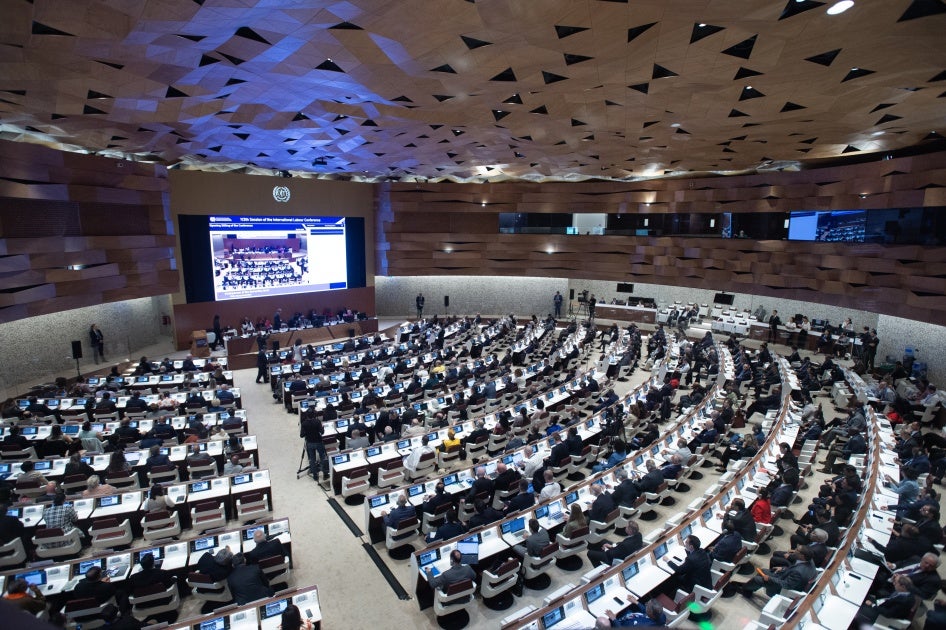(Geneva) – Governments and employers’ representatives at the International Labour Organization (ILO) conference should agree to a new treaty to protect “gig” workers, 33 civil society groups, trade unions, and human rights organizations said today. The groups released a joint declaration during the second day of the 113th session of the International Labour Conference in Geneva, which is meeting until June 12, 2025.
The groups highlighted the urgent need to address critical gaps in labor protections in the rapidly expanding platform economy, where companies recruit workers to perform jobs or “gigs” offered through apps or websites. Platform workers frequently experience employment misclassification, low and fluctuating income, lack of social security, and barriers to unionizing, while being surveilled and managed by unaccountable and untransparent algorithmic systems. Adopting an ILO convention and an accompanying nonbinding recommendation that provides guidance on the convention’s obligations is crucial for protecting platform workers’ rights.
“Platform companies profit enormously from a business model that strips workers of their rights,” said Lena Simet, senior economic justice researcher and advocate at Human Rights Watch. “The adoption of a Convention and Recommendation would send a powerful signal that technological change should not come at the cost of human rights.”
The groups emphasized in their joint declaration that employers should not misclassify platform workers as independent contractors since that denies them rights to minimum wage protections, freedom of association and collective bargaining, and social security. Platform workers may not even have human supervisors and are subjected to opaque decision-making by automated algorithms, further eroding their job security and working conditions.
“Platform workers are at the forefront of new forms of data exploitation in the workplace,” said Tom West, program director of Privacy International. “Secret algorithms, biased decisions and a lack of rights have all contributed to a deterioration in working conditions and employee/employer relations. A new ILO convention must respond to this technological environment and prevent these harmful practices becoming further entrenched and accepted.”
There are currently no binding international laws that explicitly address the labor conditions experienced by platform workers, though international human rights law outlines the protections that all workers are entitled to. The ILO has an urgent opportunity to ensure that platform workers, a significant and growing part of the work force, are able to access their rights in full.
The proposed international standards should explicitly recognize waiting periods for assignments as working time, establish clear criteria to prevent disguised employment relationships, and create effective grievance mechanisms and access to a remedy for workers harmed by algorithmic management.
“Platform workers face insecurity, low pay, and are excluded from social security while companies make billions,” said Isabel Ortiz, director of Global Social Justice. “Binding ILO standards are crucial to ensure these precarious workers have decent jobs and are included in social security systems. Some countries have shown it can be done; now it must happen everywhere.”
The joint declaration builds on research by academic scholars, civil society organizations, and governments highlighting the unregulated platform economy’s role in deepening inequality and eroding labor standards around the globe. A recent Human Rights Watch report documented that many platform workers in the United States earn below minimum and living wages, lack adequate social protection, and experience invasive and nontransparent algorithmic control. Moreover, platform companies often avoid tax and social security contributions, undermining funding for public services and social protection, all while building billion-dollar industries.
“This is a pivotal opportunity to shape the future of work with fairness and accountability at its core,” said Eduardo Carillo, consultant in public policy and international incidence at The Association of Technology, Education, Development, Research, Communication (TEDIC). “By adopting binding standards, the international community can reaffirm its commitment to protecting workers in an increasingly digitalized economy. This declaration also underscores the need for a coordinated effort among diverse stakeholders to closely follow the upcoming discussions at the ILO and advocate for outcomes that uphold fair work standards and serve the interests of workers worldwide.”
Negotiations on the new standards are underway at the International Labour Conference. The discussions on scope and content will conclude at the 114th session in 2026, when the final instruments would be formally adopted if member states, and employers’ and workers’ representatives reach agreement.
The groups urge governments and employers to commit to strong, binding international standards that reflect the realities of platform work, protect human rights, and reinforce the ILO’s mandate to secure decent work for all.
- Barwaqa Relief Organization
- Biozid Climate Institute
- Centre for Environment, Human Rights & Development Forum - CEHRDF, Bangladesh
- Centro de Estudios de Derecho, Justicia y Sociedad (Dejusticia), Colombia
- CFF-Ghana
- Derechos Digitales
- Disability Peoples Forum Uganda
- Equidem
- Federation of Environmental and Ecological Diversity for Agricultural Revampment and Human Rights (FEEDAR & HR)
- Gig and Platform Services Workers Union (GIPSWU) India
- Global Coalition for Social Protection Floors
- Global Social Justice
- Human Rights Watch
- Institute for Economic Justice, South Africa
- Institute of the Blessed Virgin Mary - Loreto Generalate
- Interfaith Center on Corporate Responsibility (ICCR)
- ISIZIBA Community Based Organizations of South Africa NPC
- IT for Change
- International Trade Union Confederation (ITUC)
- International Lawyers Assisting Workers (ILAW)
- Jamaa Resource Initiatives, Kenya
- La Maison des Livreurs, Bordeaux, France
- Lieferando Workers Collective
- LUNA CRECIENTE - Movimiento Nacional de Mujeres de Sectores Populares
- Médecins du Monde France
- Migrant*innen für Menschenwürdige Arbeit
- National Forum for Human Rights – Yemen
- Privacy International
- Success Capital Africa
- Syndicat Chrétien des Travailleurs du Congo SCTC
- TEDIC
- The African Youth Cafe
- The Doaba Foundation







